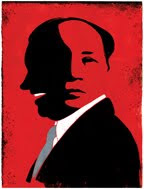
Nixon in China opened in Houston in 1987, 15 years after the historic visit. By that time, the once-disgraced president had re-emerged as an elder statesman of sorts. His counterpart Chairman Mao had been dead for eleven years, but lived on in embalmed state at Tienanmen Square. The leaders of that day were Ronald Reagan and Deng Xiaoping, both of whom were responsible for economic experiments in their respective countries (supply side economics in the US and market socialism in China) that have had lasting impact.
What would audiences of the day have thought? China has always had a complex place in the American imagination, and the visit of Richard Nixon to “Red China” must count as one of the more curious inversions of US politics and international diplomacy. In this sense, John Adams’ rendition of the Nixon visit, while fanciful, is perhaps no more so than the audacity of the real life event and circumstances surrounding it, which are described so elegantly in Margaret MacMillan’s book Nixon in China: The Week that Changed the World.
A dozen years earlier, Pierre Elliot Trudeau and Jacques Hébert travelled to China, well before they became household names in Canada, and wrote about their experience in the book Two Innocents in Red China. In the 2007 re-issue, Alexandre Trudeau writes in a lengthy and thoughtful introduction that his father was no innocent. Pierre Trudeau’s visit to China was as much an escape from the intellectual and societal confines of Duplessis Quebec as it was a quest to see an ancient civilization that faced its own confinement, for ideological reasons, from the rest of the world. Trudeau returned to China as Prime Minister of Canada in 1973, and played a role in ending the international diplomatic confinement of the middle kingdom.
Pierre Trudeau and Richard Nixon did not get along, but they had in common a fascination with China, and in particular with Chairman Mao Zedong. On the occasion of the Canadian premiere of Nixon in China, performed by the Vancouver Opera, the Asia Pacific Foundation of Canada is pleased to partner with the Opera in hosting a literary luncheon on March 16 at which Margaret MacMillan and Alexandre Trudeau will have a conversation about Mao, Nixon, and Trudeau.
When Nixon in China is performed for the first time in Canada, it will be against the backdrop of, on the one hand, an ascendant and increasingly assertive China, and on the other, a United States that is enmeshed in war, hobbled by debt, and unfamiliar with the new global terrain of diffuse leadership. The most recent visit of an American President to Beijing, by Mr Obama in December 2009, was described in the Globe and Mail as “A G2 of Nations – On China’s Terms”.
The visit of our own Prime Minister to China, shortly after the Obama trip, should also be seen in this new context. It is not just that China is an increasingly important global power and that the US is in the economic doldrums. It is that Canada has become less important both to the United States and to China – two countries for which the term “special relationship” has often been used (and misused).
Prior to his China trip, Mr Harper made a statement in Singapore about how Canada’s prosperity in the past depended on trans-Atlantic ties, but that in the future, our country’s prosperity will increasingly depend on links across the Pacific. Previous Canadian Prime Ministers – including Trudeau, Clark, Mulroney, Chretien, and Martin -- made similar comments, but they had the luxury of describing the importance of Asia in hypothetical or futuristic terms and doing not much about it. Mr Harper is in many ways the most unlikely Canadian Prime Minister in modern times to have made such a statement and for that reason alone, his comments are significant. But what is more noteworthy is that his words were uttered at a time when the importance of Asia for the world economy is not just an idle projection or hypothesis. Whereas Mr Trudeau, for example, could propose greater emphasis on Asian countries as a third “option” for Canadian foreign policy, the importance of Asia for Canada today is not merely an option, but an imperative.
Yuen Pau Woo, President and CEO
Asia Pacific Foundation of Canada

0 Response to "A Few Words from Asia Pacific Foundation of Canada’s CEO Yuan Pau Woo"